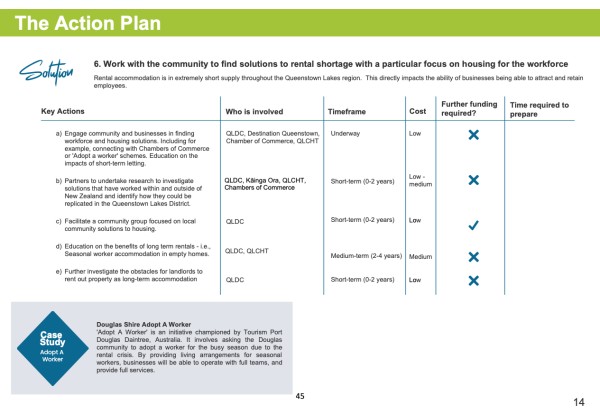Aus adopt a worker scheme unearths 12 rooms for workers

An ‘Adopt a Worker’ initiative rolled out in Northern Queensland mustered just 12 rooms for workers.
The Douglas Shire case study is highlighted in a new Queenstown Lakes District Council housing action plan, which proposes a similar scheme to encourage local residents to open their homes to workers due to the current rental crisis.
It is one of the immediate solutions outlined in the draft Joint Action Housing Plan (JAHP), which will be discussed by councillors this week.
According to the draft plan, work on the QLDC’s version of the adopt a worker scheme is already underway, in collaboration with Destination Queenstown, the Queenstown Chamber of Commerce and the Queenstown Lakes Community Housing Trust.
A spokesperson for Tourism Port Douglas Daintree, which championed the project for the local council, says it was introduced in June last year.
“The program was very well received by the local community, however was only able to unearth 12 rooms directly. These were taken up quickly by staff already employed.”
However, the spokesperson says the scheme “was deemed a success”.
“It managed to house some extra staff, who may have left the area and their jobs if they didn’t find a place.
“Every additional set of hands makes a big difference in a small business being able to operate during high-demand periods.”

The council is already working on its own 'Adopt a Worker' scheme.
Like Queenstown and surrounds, the Port Douglas and Daintree area is a holiday hotspot attracting visitors from all over the world.
With a population of approximately 4,000 people, there was “only so much capacity” to unearth, the spokesperson says.
“The campaign raised awareness within the local community around the severity of the housing crisis and led to organic growth in the rooms and granny flats being advertised on local Facebook pages.”
The spokesperson confirmed the organisation has recently shared details of the scheme with counterparts in Queenstown.
Councillors will consider the JAHP this week, but will they consider opening their own homes for workers?
Crux has today asked the mayor and all councillors if they are in a position to adopt a worker and, if so, if it is something they are considering.
Deputy mayor Quentin Smith says he has a spare room in his Wānaka home, but he isn’t considering letting it to a worker short-term.
“We enjoy our family privacy and space.”
It is his view responsibility for housing workers should first fall to businesses and then, secondly, to landlords.
“You can’t complain about housing prices and worker shortages and let your house on AirBnb or other platforms - the two are completely counter purpose.”
Over the hill in the Whakatipu, councillor Esther Whitehead says she has no immediate plans to rent a room in her home, although she may consider it “mid-winter”.
“The scheme is good but not ground-breaking in anyway, although, it does formalise what already exists on Queenstown Trading and I think it will open up new rental rooms. I hope it does make a difference.”
She thinks a key benefit will be data generation, because that is something missing right now.
Across the Tasman, the Douglas Shire created two registries – one for businesses with workers needing a place to stay, and another for households with a spare room or two.
Councillor Whitehead says “a key benefit of this will be that QLDC will actually hold information on numbers of people searching for accommodation and this will be helpful to further build a case to central government and have data available that doesn't currently exist in one place”.
Meanwhile Councillor Matt Wong says his house is full up and he already has one renter, so taking in any further extras is not an option for his family.
“We charge $275 per week for a fully self-contained granny flat. It’s on the cheaper side but they’re a good tenant. Our current tenant has been with us for about six years and prior to that we homed long term renters and seasonal workers.
He says his household prefers having a longer-term tenant to the idea of managing short-term visitor accommodation.
“It’s each homeowners choice what they do with their spare room but if there’s a will, like in our case, then it provides a home for local workers.”
There is also no room at the inn in the case of Councillor Niki Gladding, who has two children at home and no spare room.
She thinks the ‘Adopt a Worker’ scheme is “definitely worth a shot” but has some reservations.

Councillor Lisa Guy says her adult children live with her, having returned to the district from overseas, and that frees up rentals for others.
“It could be a great temporary 'win-win' solution for some workers and households. However, it probably wouldn't be an option for families, the elderly, or those who, for whatever reason, aren’t ‘workers’; people matter - not just the economy.”
It is also important, in her view, that the scheme doesn’t “mask the severity of the crisis and delay long-term solutions”.
“Any initiative like this should be a wake-up call for central government - not cause for celebration. The minister needs to stop using rental bond data as a shield and accept what's happening on the ground; she must make long-term letting an appealing, or at least a viable, option for property owners. And the government must address the absence of emergency housing in this district."
Although he did not comment on whether he would consider taking in a worker, Councillor Barry Bruce echoed Councillor Gladding's sentiments.
"As a general opinion I support any accommodation and housing initiatives by QLDC and other organisations, however I believe we are just tweaking the system instituted by central government, which unfortunately has a one-size-fits-all approach that has no appreciation for the housing issues our region faces."
Councillor Lisa Guy says she has no spare rooms at her place, which is full with "three generations" as her mum and her adult children live with her.
She says the household is busy, "often filled with more people than rooms" and the inter-generational living arrangement needs "clear boundaries" to work harmoniously for everyone. Adult children willing to stay with mum and dad, when they do live in the district, frees up desperately needed rentals for others, she says.
In the past, when space has allowed, she has taken in extras outside of her family, and she would do it again.
"Over the years here we’ve supported many who have moved to the district to find homes and gather furnishings or to have a temporary first port of call with an arrival landing stop. There are so many ways we can support new arrivals and help them merge into our villages and communities.
"If anyone has a room to help this season, I encourage them to consider adopting a worker. So many great people are looking for some support to stay and contribute to our communities over the coming months."
Councillor Craig Ferguson says he has spare rooms, and will consider taking in extras. He already has one room rented out for $150 per week.
Main image (https://www.visitportdouglasdaintree.com/corporate/adopt-a-worker): Across the ditch in Queensland a small tourist town championed an 'Adopt a Worker' scheme last winter as a rental squeeze hurt local businesses needing homes for workers.


























